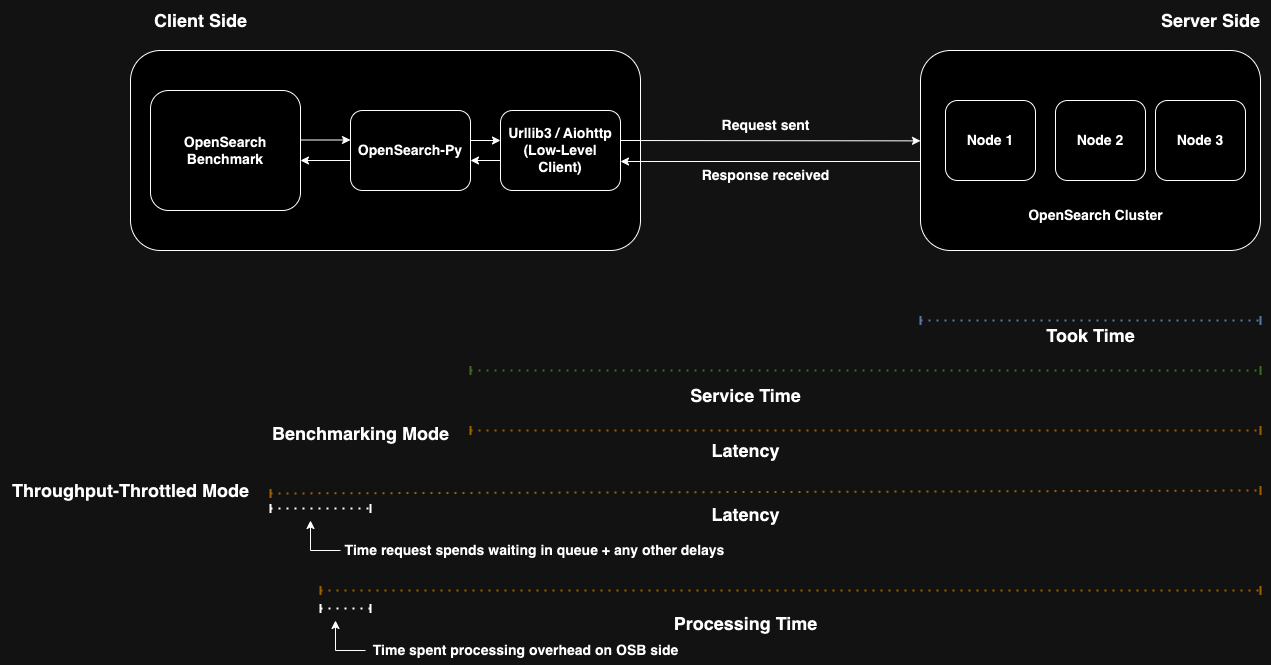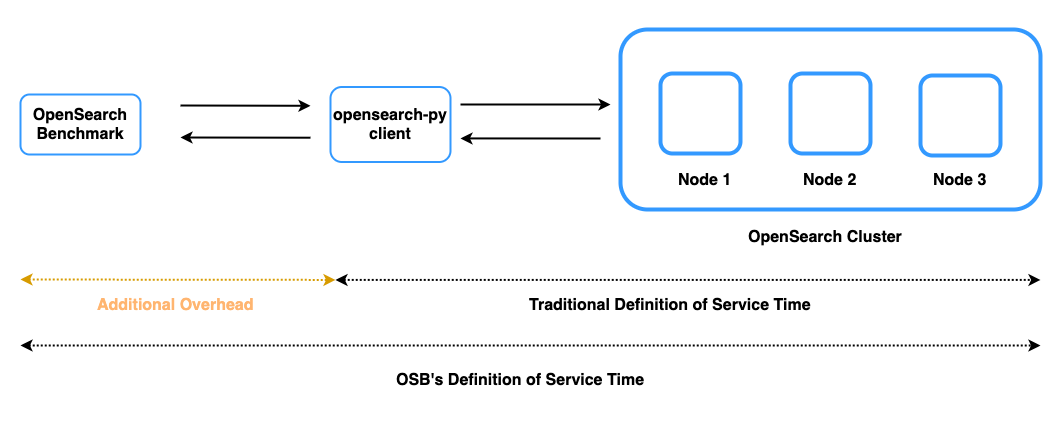Concepts
Before using OpenSearch Benchmark, familiarize yourself with the following concepts.
Core concepts and definitions
- Workload: A collection of one or more benchmarking scenarios that use a specific document corpus to perform a benchmark against your cluster. The document corpus contains any indexes, data files, and operations invoked when the workload runs. You can list the available workloads by using
opensearch-benchmark list workloadsor view any included workloads in the OpenSearch Benchmark Workloads repository. For more information about the elements of a workload, see Anatomy of a workload. For information about building a custom workload, see Creating custom workloads. A workload typically includes the following:- One or more data streams that are ingested into indexes.
- A set of queries and operations that are invoked as part of the benchmark.
- Pipeline: A series of steps occurring before and after a workload is run that determines benchmark results. OpenSearch Benchmark supports three pipelines:
from-sources: Builds and provisions OpenSearch, runs a benchmark, and then publishes the results.from-distribution: Downloads an OpenSearch distribution, provisions it, runs a benchmark, and then publishes the results.benchmark-only: The default pipeline. Assumes an already running OpenSearch instance, runs a benchmark on that instance, and then publishes the results.
- Test: A single invocation of the OpenSearch Benchmark binary.
Test concepts
At the end of each test, OpenSearch Benchmark produces a table that summarizes the following:
The following diagram illustrates how each component of the table is measured during the lifecycle of a request involving the OpenSearch cluster, the OpenSearch client, and OpenSearch Benchmark.

Differences between OpenSearch Benchmark and a traditional client-server system
While the definition for throughput remains consistent with other client-server systems, the definitions for service time and latency differ from most client-server systems in the context of OpenSearch Benchmark. The following table compares the OpenSearch Benchmark definition of service time and latency versus the common definitions for a client-server system.
| Metric | Common definition | OpenSearch Benchmark definition |
|---|---|---|
| Throughput | The number of operations completed in a given period of time. | The number of operations completed in a given period of time. |
| Service time | The amount of time that the server takes to process a request, from the point it receives the request to the point the response is returned. It includes the time spent waiting in server-side queues but excludes network latency, load balancer overhead, and deserialization/serialization. | The amount of time that it takes for opensearch-py to send a request and receive a response from the OpenSearch cluster. It includes the amount of time that it takes for the server to process a request and also includes network latency, load balancer overhead, and deserialization/serialization. |
| Latency | The total amount of time, including the service time and the amount of time that the request waits before responding. | Based on the target-throughput set by the user, the total amount of time that the request waits before receiving the response, in addition to any other delays that occur before the request is sent. |
For more information about service time and latency in OpenSearch Benchmark, see the Service time and Latency sections.
Processing time
Processing time accounts for any extra overhead tasks that OpenSearch Benchmark performs during the lifecycle of a request, such as setting up a request context manager or calling a method to pass the request to the OpenSearch client. This is in contrast to service time, which only accounts for the difference between when a request is sent and when the OpenSearch client receives the response.
Took time
Took time measures the amount of time that the cluster spends processing a request on the server side. It does not include the time taken for the request to transit from the client to the cluster or for the response to transit from the cluster to the client.
Service time
OpenSearch Benchmark does not have insight into how long OpenSearch takes to process a request, apart from extracting the took time for the request. It makes function calls to opensearch-py to communicate with an OpenSearch cluster.
OpenSearch Benchmark measures service time, which is the amount of time between when the opensearch-py client sends a request to and receives a response from the OpenSearch cluster. Unlike the traditional definition of service time, the OpenSearch Benchmark definition includes overhead, such as network latency, load balancer overhead, or deserialization/serialization. The following image shows the differences between the traditional definition and the OpenSearch Benchmark definition.

Latency
Latency measures the total time that the request waits before receiving the response as well as any delays that occur prior to sending the request. In most circumstances, latency is measured in the same way as service time, unless you are testing in throughput-throttled mode. In this case, latency is measured as service time plus the time that the request spends waiting in the queue.
Throughput
Throughput measures the rate at which OpenSearch Benchmark issues requests, assuming that responses will be returned instantaneously.